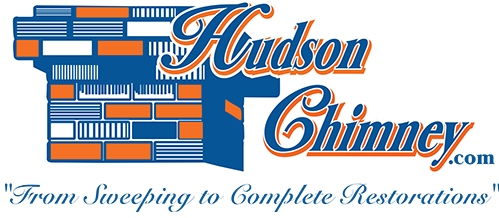by Mark Hudson | Aug 25, 2016 | Chimney Cleaning
When you own a home, you should keep up with the routine maintenance tasks needed to keep everything running smoothly and safely. Neglecting important maintenance can lead to dangerous hazards in your home. At Hudson Chimney, our top priority is fire safety, and we provide chimney and venting maintenance services to the residents of the Jacksonville area that prevent accidental fires and carbon monoxide leaks. For our busy customers, we offer the opportunity to take care of two of these services, chimney sweeping and dryer vent cleaning, on the same appointment date. We strongly suggest that you should go ahead and schedule this appointment now before the busy season of fall begins. It can be difficult to find the most convenient time, and you may end up having to wait even longer to take care of these maintenance tasks. We would like to tell you more about the importance of a professional chimney sweeping and a dryer vent cleaning.
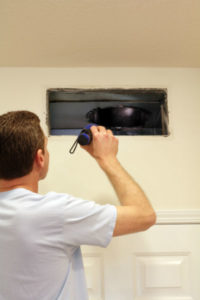
CHIMNEY SWEEPING
When you burn wood in your fireplace or stove, creosote develops naturally during the combustion process. As smoke and the other byproducts of combustion pass through the cooler upper walls of the chimney, condensation occurs. During condensation, creosote forms and sticks to the inner chimney walls. After a long winter, large accumulations of creosote deposits can cover parts of the chimney and create a dangerous fire hazard. Creosote is so highly flammable that the Chimney Safety Institute of America (CSIA) has named this natural compound as a leading cause of chimney fires. To remove all of the creosote deposits from your chimney, you need a professional chimney sweeping. This is why the CSIA, the National Fire Protection Association (NFPA), and other top national fire safety groups recommend having your chimney professionally swept and inspected at least once a year. You can trust Hudson Chimney to remove every bit of creosote from your chimney because our chimney sweeps have been certified by the CSIA and have the training and experience to do this job properly and reduce your risk of a chimney fire.
DRYER VENT CLEANING
Every year, thousands of clothes dryer fires are reported in this country. The majority of these fires are the result of clogged and dirty dryer vents. Every time you dry a load of clothes, lint is produced. Although about 75 percent of that lint is collected in the lint screen, the rest of it falls into the vent. After a period of time, that lint can accumulate into a large enough amount to clog the vent. This is a very dangerous situation because lint is extremely flammable. Since a clogged dryer vent causes the dryer to overheat, those high temperatures can easily ignite the trapped lint inside a vent. You will know your dryer vent needs cleaning when your dryer cannot fully dry a load of clothes in one complete drying cycle. To prevent a clothes dryer fire, Hudson Chimney recommends that you schedule a professional dryer vent cleaning appointment with us every year. Not only will the risk of an accidental clothes dryer fire be greatly reduced, your dryer will work much more efficiently. Prolonging the life of your dryer, preventing fires, and lowering your utility bills are among the benefits of our professional dryer vent cleaning services.
Make sure your home is safe with no fire hazards. Contact us at Hudson Chimney to schedule an appointment for our professional chimney sweeping and dryer vent cleaning services today.
by Mark Hudson | Aug 11, 2016 | chimney maintenance
If you have noticed a discolored stain on the exterior of your chimney, you have good reason to be concerned. Not only is discoloration on a chimney exterior unattractive, but it also can signal a problem that could lead to more chimney damage. Different colors can signify different problems, and it is important to know which colors appear with each issue to troubleshoot the needed repairs. For over 30 years, Hudson Chimney has been serving the chimney maintenance, repair, and installation needs to residents of the Jacksonville area, and you can trust us to diagnose the cause of the discoloration and fix the problem behind the stains. Our chimney technicians have been certified by the Chimney Safety Institute of America (CSIA), so you are getting both experienced and trained chimney service from us. We would like to tell you the possible causes behind different colors of stains on the exterior of your chimney to help you know more about the reason for the discoloration.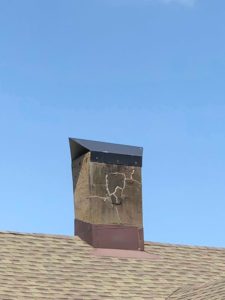
WHITE STAINS
If the discoloration you notice on the outside of your chimney is white, you are seeing efflorescence stains, which is formed by mineral salt remaining on the bricks and mortar from the evaporation of water. While efflorescence could be caused by rain blowing against the chimney during a storm, this discoloration often signifies the existence of a chimney water leak. Hudson Chimney can inspect your chimney to find the leak, repair the source of the leak, and remove the stains. To prevent water penetration of your chimney and efflorescence, we recommend our waterproofing service that creates a barrier to water penetrating the bricks and mortar and also keeps efflorescence from discoloring your chimney.
BLACK OR BROWN STAINS
While darker stains can also be the result of water penetration in the case of mold, Hudson Chimney finds black or brown chimney stains to more commonly be discoloration from creosote or soot. The appearance of creosote running out of the top of your chimney should be taken seriously as a strong risk of a chimney fire. Creosote is extremely flammable, and if enough creosote is in your chimney that it is pouring out, you definitely have enough creosote inside to ignite a chimney fire. If you have a gas fireplace, black or brown stains are not creosote but soot and are an equally important warning sign. According to Inspectapedia, soot stains should alert you to a dangerous situation of a high risk of the overproduction of carbon monoxide inside the chimney. You should contact Hudson Chimney as soon as possible when you see black or brown stains to have us take care of these safety hazards.
RED STAINS
When you see red or reddish-brown discoloration on the exterior of your chimney, you have an issue with rusting. The most common cause for rust stains is corrosion damage on your metal chimney cap. If your chimney cap has suffered from corrosion, it could be damaged by cracks that will allow water to leak into your chimney to cause even more damage. Hudson Chimney can help by installing a new chimney cap that will protect your chimney from water leaks.
The color of stains on the outside of your chimney can alert you to a serious chimney problem that could make your fireplace unsafe to use. Contact us at Hudson Chimney to schedule an inspection to determine the source of discoloration and make the necessary repairs.
by Mark Hudson | Jul 28, 2016 | Firewood
Although some people believe the key to burning the best wood fires is using a certain species of wood, the reality is using firewood that has been sufficiently seasoned, or dried, after it has been cut. Properly seasoned wood will give you cleaner, safer, and longer lasting fires because the fire does not have to waste so much energy burning out the moisture as it does with freshly cut green wood. A fire burning green wood can lead to an overproduction of smoke and creosote, which can be harmful to your chimney. Wood naturally contains a lot of water. Green wood can have a moisture content of 40 percent. Allowing your wood to dry out for at least six months will reduce that content by half. To help you perfect your firewood seasoning and storing skills, Hudson Chimney would like to tell you a few tips so that you can have the best firewood to be able to enjoy warm and clean fires this winter.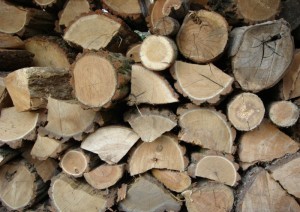
Split the wood.
If you are able to cut your own firewood, you should split each piece so that air will be able to get to every side of the wood. This will speed up the drying process. You want to ensure each piece of wood is no longer than six inches so that it will fit inside your fireplace or stove. If you buy your firewood, you can split it at home yourself if it has not already been split. To make this job easier, Firewood For Life recommends using a sharp splitting axe or a hydraulic wood splitter.
Choose the right location for storing your wood.
For the sake of convenience, you want to pick a spot that is close to your home. Even more importantly, you should choose a location that gets full sun to take advantage of its heat. The sun is a great help in drying out the moisture, and the moisture will evaporate much more quickly in the sun.
Stack the wood elevated off the ground.
Storing your firewood directly on the ground will slow down the drying time because the wood will absorb even more moisture from the earth. If you do not have a storage shed, you can use pallets as a platform for storing. A storage rack is another good idea. Stack the wood in a criss cross pattern will help the air be able to circulate better around your firewood.
Cover the top.
If you have a storage shed, you want to be sure it is not completely enclosed by walls. Air circulation is very important for seasoning firewood as it helps to evaporate the moisture. If you do not have a storage shed, you can cover your supply with a tarp or a fireplace cover to protect it from rain. Ensure that the sides are open so that moisture is not trapped inside your stacks of wood.
After you have stacked and stored your firewood, all you need to do is wait for at least six months for properly seasoned firewood. Contact us at Hudson Chimney for even more firewood tips, along with any of your fireplace and chimney needs.
by Mark Hudson | Jul 12, 2016 | Dryer Vent Cleaning
One of the biggest signs that you have a clogged clothes dryer vent is when it takes more than one cycle to completely dry one load of clothes. If you have noticed that it is taking your clothes longer to dry, you should contact us at Hudson Chimney to schedule an appointment for our professional dryer vent cleaning services. Not only does a dirty dryer vent cause your dryer to not work as well as it should, it also creates a dangerous fire hazard. According to the US Fire Administration, 2,900 clothes dryer fires were reported each year between 2008 and 2010, and these fires resulted in approximately five deaths, 100 injuries, and $35 million in property losses. Most of these fires started due to dirty and clogged dryer vents. This is why many national fire safety organizations recommend that homeowners have their dryer vent system professionally cleaned at least once a year. This service will also save you money on utility bills because you will not have to run your dryer twice as long to dry your clothes. We would like to share some more clothes dryer safety tips to help you reduce this fire risk and prevent clothes dryer fires.
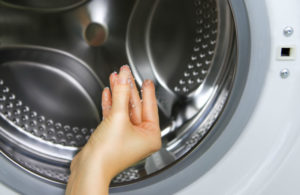
Never use your dryer without a lint filter.
Lint is so flammable that the Boy Scouts of America recommend using it to start campfires. Since your clothes dryer produces a lot of lint, you need the lint filter to collect as much of it as possible. You should always clean the lint filter before or after each load. Although this does trap a lot of lint, your vent will still have loose lint that accumulates over time. When lint builds up enough to block the vent, you could easily have a dryer fire since the excessive heat from the dryer can ignite lint.
Be sure your vent is made from the right material.
For proper air flow, your vent should be constructed from rigid or flexible metal venting material. You also should ensure that the air exhaust vent pipe has no restrictions. The vent flap on the outside of your home should open when your dryer is in use.
Follow the manufacturer’s instructions.
Read the owner’s manual for your clothes dryer, and do not overload your dryer with too many clothes. Check the plug for your dryer and be sure it is plugged into the right type of outlet. If you have a gas-powered dryer, it should be inspected annually to ensure the gas line and connection have no leaks.
If you have damp clothes at the end of one drying cycle, your dryer vent is most likely clogged. Contact us at Hudson Chimney to schedule an appointment for our professional dryer vent cleaning services.
by Mark Hudson | Jun 27, 2016 | chimney maintenance
During the summer, your fireplace is probably the last thing you are thinking about, but unpleasant odors coming into your home from your chimney through the fireplace will quickly remind you. Hudson Chimney has been working on the chimneys of Jacksonville area residents for over 30 years, and we have lots of experience with diagnosing and solving chimney odor problems. The heat and humidity of the summer months can worsen these stinky smells, and, because your home is weatherized to keep the cold air inside, you are more likely to have chimney draft problems that allow these odors to be blown into the house. Different things can cause chimney odors, and we would like to tell you a bit more about these smelly factors and how we can take care of your stinky chimney.
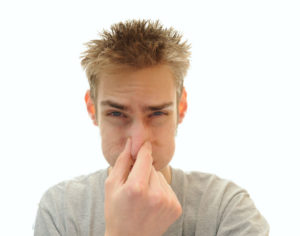
Do you notice a bad barbecue or asphalt odor?
If it smells like someone has burned food on the grill or like your street is being paved, the source of your chimney odor is creosote. Formed naturally during the combustion process of burning wood, creosote sticks to the inner walls of your chimney and can accumulate into large deposits. Not only does creosote have a strong, acrid odor, it also is so highly flammable that the Chimney Safety Institute of America (CSIA) says that creosote is a leading cause of chimney fires. To keep your home smelling sweet and to reduce your risk of a chimney fire, Hudson Chimney recommends scheduling your annual chimney sweeping in the spring or summer. Our CSIA-certified chimney sweeps will make sure to remove every bit of creosote from the inside of your chimney.
Is the smell musty?
If you notice a musty odor, you most likely have standing water on the smoke shelf. To keep water out of your chimney, you need a good quality chimney cap professionally installed on the top of the chimney. Without a cap, water from rain can easily get into your chimney and land on the smoke shelf. Leaves, sticks, and dirt can also fall into your chimney, and when this debris mixes with standing water, you could end up with a rotting odor coming from your chimney. Hudson Chimney offers a wide variety of chimney caps, and we can help you pick out the perfect cap for your chimney and install it to protect your chimney from water leaks.
Has your home been invaded by a rotting, decomposing stench?
The worst case odor scenario is a dead bird, squirrel, raccoon, or other wild animal in your chimney. These critters often mistake chimneys for trees and get inside the flue to nest. Unfortunately, it can be easy for a bird or animal to become trapped inside and die within your chimney. To prevent this situation from occurring, you need a chimney cap that is equipped with mesh metal sides that will keep birds and wild animals from being able to get into the chimney. Hudson Chimney knows which caps work the best against animal invasions and can help you stop these creatures from nesting inside your chimney.
Keep your home smelling fresh this summer. Contact us at Hudson Chimney to schedule an appointment for a chimney sweeping and inspection today.

